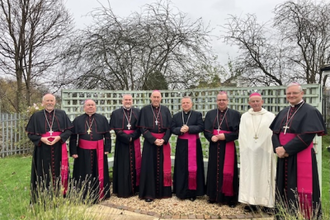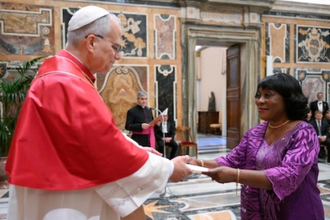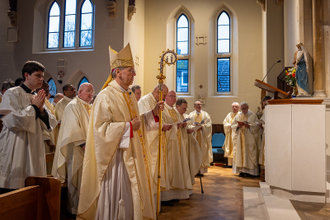New Hate Crime Bill - freedom to disagree must be protected, say Scotland's Bishops

Anthony Horan
Source: SCMO
The Bishops' Conference of Scotland has responded to the Scottish Government's new Hate Crime and Public Order Bill. In a submission to the Scottish Parliament Justice Committee the Conference has stated that any new law must be 'carefully weighed against fundamental freedoms, such as the right to free speech, freedom of expression, and freedom of thought, conscience and religion.'
The bill proposes to modernise, consolidate and extend hate crime legislation in Scotland, including introducing a new offence of stirring up hatred, possession of inflammatory material, and new protection of freedom of expression provisions in relation to religion and sexual orientation.
Commenting on the submission, the Director of the Catholic Parliamentary Office, Anthony Horan said: "Whilst acknowledging that stirring up of hatred is morally wrong and supporting moves to discourage and condemn such behaviour the bishops have expressed concerns about the lack of clarity around definitions and a potentially low threshold for committing an offence, which they fear, could lead to a 'deluge of vexatious claims'."
"A new offence of possessing inflammatory material could even render material such as the Bible and the Catechism of the Catholic Church...inflammatory. The Catholic Church's understanding of the human person, including the belief that sex and gender are not fluid and changeable, could fall foul of the new law. Allowing for respectful debate, means avoiding censorship and accepting the divergent views and multitude of arguments inhabiting society."
Mr Horan added: "The Church believes that fundamental freedoms must be protected, as the right to exercise freedom, especially in moral and religious matters, is 'an inalienable requirement of the dignity of the human person' and 'a right that must be recognised and protected by civil authority, always within the limits of the common good and public order'. The courts have noted that the freedom to shock, offend and disturb, as well as the contentious and unwelcome are protected by the right to freedom of expression, and the bishops have declared that freedom of expression provisions must be robust enough to protect the freedom to disagree.
Mr Horan concluded: "The bishops decry so-called 'cancel culture' in their submission, expressing deep concern at the 'hunting down of those who disagree with prominent orthodoxies with the intention to expunge the non-compliant from public discourse and with callous disregard for their livelihoods'. They say that 'no single section of society has dominion over acceptable and unacceptable speech or expression' and urged the law to be proportionate and fair and allow for respectful debate and tolerance lest we become an 'intolerant, illiberal society'."
The full text of the submission to the consultation is shown below:
Catholic Church responds to Hate Crime and Public Order (Scotland) Bill Consultation
Justice Committee - Hate Crime and Public Order (Scotland) Bill
Consolidation
2. The Bill brings together the majority of existing hate crime laws into one piece of legislation. Do you believe there is merit in the consolidation of existing hate crime laws and should all such laws be covered?
We agree that there is merit in consolidating existing hate crime laws.
Other forms of crime not included in the Bill
5. Do you think that sectarianism should have been specifically addressed in this Bill and defined in hate crime legislation? For example, should a statutory aggravation relating to sectarianism or a standalone offence have been created and added?
Existing legislation, including existing statutory aggravations, adequately covers offences relating to sectarianism.
We agree with Lord Bracadale that the absence of such an aggravation would not leave a gap in the law as both race and religion statutory aggravations can be attached to any base offence if proven.
Stirring up offences
6. Do you have views on the merits of Part 2 of the Bill and the plans to introduce a new offence of stirring up of hatred?
As expressed in Lord Bracadale's report into hate crime in Scotland, criminalising conduct is a serious step that should not be taken lightly. And any new law must be carefully weighed against fundamental freedoms, such as the right to free speech, freedom of expression, and freedom of thought, conscience and religion.
There is no argument with the proposition that stirring up of hatred is morally wrong. Furthermore, there is no argument with the reasonable belief that stirring up of hatred may lead to violence, public disorder, and may incite others to commit offences.
To create an offence whereby this kind of conduct is discouraged and condemned is a positive move. However, this must be balanced against existing legislation. It must also be balanced with fundamental freedoms, and the terminology used in any new law must accurately capture the offending behaviour being criminalised. The law must also be sufficiently clear for society to understand it and for the judiciary to be able to apply it. In terms of balancing fundamental freedoms, we have set out our response in our answer to question 8.
The provisions of the proposed new stirring up offence consist of a two-part test. Sections 3(1) and 3(2) set out that, for an offence to be established, the behaviour or communication must be threatening or abusive (or insulting in the case of race). This is the first part of the test. The second part of the test is that by this behaviour or communication, the person 'intends' to stir up hatred against a group of persons (with a protected characteristic), or there is a 'likelihood' that hatred will be stirred up against such a group. How hatred is defined is not clear which leaves it open to wide interpretation. This could lead to vexatious claims having to be dealt with by police.
The proposed threshold for an offence under the stirring up provisions might also be considered disproportionately low. For example, A might disagree with B's belief that a biological male cannot become a woman. A might even go so far as to say that B is 'talking nonsense' and that he is 'transphobic' and say so either in person or on a social media platform such as Twitter. The term abusive includes being offensive or mistreating and B feeling offended against, the first test is met. In terms of the second test, a group of people accompanying B deem the comments to be an intention to stir up hatred against them as a group, and thus the second test is met.
The behaviour of A should not be criminalised and criminal liability should not be determined solely on the subjective. The test must be stronger and allow the law to be consistent and not forever stretched in multiple ways to meet the capricious sensibilities and mores of the current culture and public opinion.
Further, the introduction of an offence of 'likelihood' (sections 1(b)(ii) and 2(b)(ii)) removes the mens rea (mental) element; a critical aspect of the common law test of criminal liability in Scots law.
An approach which may strike a better balance between the type of behaviour which ought to be criminalised and the public interest and fundamental freedoms is the 'hypothetical reasonable person', as prescribed in section 38 of the Criminal Justice and Licensing (Scotland) Act 2010, and remarked on in Paterson v Harvie.
Section 38 of the Criminal Justice and Licensing (Scotland) Act 2010 provides that a person commits an offence if he behaves in a threatening and abusive manner and the behaviour would be likely to cause a reasonable person to suffer fear or alarm, and he intends by the behaviour to cause fear and alarm or is reckless as to whether the behaviour would cause fear or alarm.
In Paterson v Harvie [2014] HCJAC 87 it was held on appeal that the 'essence of the offence under section 38 was that the accused's conduct was to be judged by an objective test in which the actual effect of the threatening or abusive behaviour on those who experienced it was irrelevant and if the objective test was met the crime was complete if the accused's behaviour would be likely to cause fear and alarm to the hypothetical [reasonable] person.' The reasonable person, it is remarked, is 'someone who is not of abnormal sensitivity.'
This test is both proportionate and clear and thus less susceptible to wide interpretation and a deluge of vexatious claims.
We are also concerned that section 5 of the Bill creates an offence of possessing inflammatory material which, if taken with the low threshold contained therein, could render material such as the Bible, the Catechism of the Catholic Church and other texts such as Bishops' Conference of Scotland submissions to government consultations, as being inflammatory under the new provision. For example, in a recent submission to the Scottish Government on proposed reform of the Gender Recognition Act 2004, the Bishops' Conference of Scotland stated the Catholic Church's understanding of the human person, including the belief that sex and gender are not fluid and changeable, and that male and female are complementary and ordered towards the creation of new life. Such pronouncements, which are widely held, might be perceived by others as an abuse of their own, personal worldview and likely to stir up hatred.
We cannot turn to censorship but must instead accept the divergent views and multitude of arguments inhabiting our society on a wide range of issues and allow for respectful debate.
7. Do you have any views on the Scottish Government's plans to retain the threshold of 'threatening, abusive or insulting' behaviour in relation to the stirring up of racial hatred, contrary to Lord Bracadale's views that 'insulting' should be removed?
Racial hatred is a grave offence that is to be condemned. The equal dignity of all human beings demands that we strive for fairer and more humane conditions for all people and that every form of social or cultural discrimination in fundamental personal rights on the grounds of race, sex, social conditions, or religion among others, must be curbed and eradicated.
We agree with Lord Bracadale's conclusion that the stirring up of racial hatred offences be limited to threatening or abusive conduct or material. As outlined in Lord Bracadale's report, the term 'insulting' was removed from an English harassment offence (s5 of the Public Order Act 1986) on the basis that 'threatening or abusive' sufficiently covered the type of conduct being targeted. Additionally, it was argued that its removal would not undermine the ability of the prosecution service to bring prosecutions. Removal of the term 'insulting' in the Scottish context would also ensure consistency across all protected characteristics.
There is also a danger that the inclusion of nationality (including citizenship) and national origins (section 3(1)) might censor some of the discussions which take place around important constitutional issues such as Scottish independence and exiting the European Union. By definition, insulting behaviour might include conduct which is insolent or causes affront. Constitutional debates are often robust and include a blunt exchange of views, which might be considered an affront by some. Consideration ought to be given to how the freedom to engage in robust and frank debate on political issues such as constitutional arguments can be protected and not fall foul of the provisions of the bill.
Other issues
8. Do you have any comments on what should be covered by the 'protection of freedom of expression' provision in the Bill?
Any new law must be carefully weighed against fundamental freedoms, such as the right to free speech, freedom of expression, and freedom of thought, conscience and religion. The right to exercise freedom, especially in moral and religious matters, is an inalienable requirement of the dignity of the human person. It is a right that must be recognised and protected by civil authority, always within the limits of the common good and public order.
Importantly the courts have expressly noted that the right to freedom of expression protects facts and opinion; and it protects expression which shocks, offends and disturbs other people. It also protects the contentious and the unwelcome. Freedom of expression provisions must be robust enough to protect the freedom to disagree.
Society must protect the right to freedom of expression across all protected characteristics and avoid singling out specific characteristics and creating a hierarchy of rights and freedoms. The right to freedom of expression is always balanced, and correctly so, against the duties and responsibilities set out in Article 10 of the European Convention of Human Rights.
As per our answer to question 6, a recent Bishops' Conference of Scotland submission to the Scottish Government on proposed reform of the Gender Recognition Act 2004 set out the Catholic Church's understanding of the human person, including the belief that sex and gender are not fluid and changeable, and that male and female are complementary and ordered towards the creation of new life. Without an appropriate freedom of expression provision such pronouncements, which are widely held, would not be protected.
Prominent public figures have been accused of hate and of transphobia for making the argument that a man cannot become a woman and vice versa. Many have also been accused of hate for using pronouns corresponding with an individual's biological or birth sex. The freedom to express these arguments and beliefs must be protected.
The growth of what some describe as the 'cancel culture' - hunting down those who disagree with prominent orthodoxies with the intention to expunge the non-compliant from public discourse and with callous disregard for their livelihoods - is deeply concerning.
No single section of society has dominion over acceptable and unacceptable speech or expression. Whilst the legislature and judiciary must create and interpret laws to maintain public order it must do so carefully, weighing in fundamental freedoms and allowing for reasonably held views, the expression of which is not intended to cause harm.
As stated in response to question 6, we cannot turn to censorship but must instead accept the divergent views and multitude of arguments inhabiting our society on a wide range of issues and allow for respectful debate and expect respectful tolerance. This does not mean anything goes. The law must provide red lines, but it must be proportionate and fair. Otherwise we risk becoming an intolerant, illiberal society.
10. What is your view on the plans for the abolition of the offence of blasphemy?
We have no objection to the plans to abolish the common law of blasphemy in Scotland. .
LINK
Scottish Catholic Media Office - www.scmo.org


















